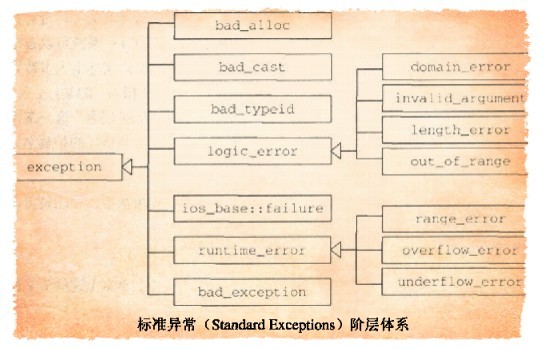异常分类
语言本身或标准程序库所抛出的所有异常,都派生自基类exception。所有这些标准异常可分为三组:(1)语言本身支持的异常;(2)逻辑错误;(3)运行时错误。
用户程序可以从第一类异常派生出自定义异常;标准库和用户程序都可以抛出后两种异常。

(图片来自参考2)
基础类别exception和bad_exception定义于<exception>
bad_alloc定义于<new>
bad_cast和bad_typeid定义于<typeinfo>
ios_base::failure定义于<ios>
其他异常类别定义于<stdexcept>
1. 语言本身支持的异常
此类异常用以支撑某些语言特性。
(1) new操作失败,会抛出bad_alloc异常(<new>中定义,new的nothrow版本不抛出异常)。
(2) 执行期间,当一个作用于reference身上的“动态型别转换操作”失败时,dynamic_cast会抛出bad_cast异常。
(3) 执行期型别辨识(RTTI)过程中,如果交给typeid的参数为零或空指针,typeid操作符会抛出bad_typeid异常。
(4) 如果发生非预期的异常(函数抛出异常规格(exception specification)以外的异常),程序会自动调用unexpected(),如果用set_unexpected自定义了unexpected函数,自定义unexpected函数中有throw;或抛出了不在异常规格中的其他异常,c++运行时环境将自动抛出bad_exception。。
If a function with bad_exception listed in its dynamic-exception-specifier throws an exception not listed in it and unexpected rethrows it (or throws any other exception also not in the dynamic-exception-specifier), a bad_exception is automatically thrown.(来自参考3)
这四异常都有三个函数:一个是构造函数,不带参数;一个是析构函数,是virtual的;第三个是virtual const char* what() throw()。这三个函数都不会再抛出异常。
(5) 还有一个异常ios_base::failure,它定义在ios_base类内部,当数据流由于错误或者到达文件末尾而发生状态改变时,就可能抛出这个异常。
2. 逻辑错误
这类异常总是派生自logic_error。
(1) domain_error指出专业领域范畴内的错误。
(2) invalid_argument表示无效参数,例如将bitset(array of bits)以char而非0或1进行初始化。
(3) length_error指出某个行为“可能超越了最大极限”,例如对某个字符串附加太多字符。
(4) out_of_range指出参数值“不在预期范围内”,例如在处理容器或string中采用一个错误索引。
3. 运行时错误
这类异常派生自runtime_error,用来指出“不在程序范围内,且不容易回避”的事件。
(1) range_error指出内部计算时发生区间错误。
(2) overflow_error指出算术运算发生上溢位。
(3) underflow_error指出算术运算发生下溢位。
源码
//std_stdexcept.h
class logic_error : public exception
{
string _M_msg;
public:
explicit logic_error(const string& __arg);
virtual ~logic_error() throw();
virtual const char* what() const throw();
};
class domain_error : public logic_error
{
public:
explicit domain_error(const string& __arg);
};
class invalid_argument : public logic_error
{
public:
explicit invalid_argument(const string& __arg);
};
class length_error : public logic_error
{
public:
explicit length_error(const string& __arg);
};
class out_of_range : public logic_error
{
public:
explicit out_of_range(const string& __arg);
};
class runtime_error : public exception
{
string _M_msg;
public:
explicit runtime_error(const string& __arg);
virtual ~runtime_error() throw();
virtual const char* what() const throw();
};
class range_error : public runtime_error
{
public:
explicit range_error(const string& __arg);
};
class overflow_error : public runtime_error
{
public:
explicit overflow_error(const string& __arg);
};
class underflow_error : public runtime_error
{
public:
explicit underflow_error(const string& __arg);
};//exception(稍有改动)
// 标准库可能抛出的所有异常的基类
class exception
{
public:
exception() throw() { }
virtual ~exception() throw();
// 返回描述当前错误的字符串, 派生类应覆写此函数
virtual const char* what() const throw();
};
class bad_exception : public exception
{
public:
bad_exception() throw() { }
virtual ~bad_exception() throw();
virtual const char* what() const throw();
};
// 参考terminate的说明
typedef void (*unexpected_handler)();
unexpected_handler set_unexpected(unexpected_handler) throw();
// 默认调用terminate, 但可以通过set_unexpected()更改其行为
void unexpected();
/**
* 当一个异常没有catch块捕获时(一层一层throw, throw到main也没有catch处理它),
* 或出现无法处理的情况, 系统将自动调用终结函数,
* 系统提供了一个默认的终结函数terminate(), terminate()会调用abort()退出程序,
* 可以通过set_terminate()来设置新的终结函数, 终结函数必须是terminate_handler类型的,
* terminate()也可以被用户调用.
*/
typedef void (*terminate_handler)();
terminate_handler set_terminate(terminate_handler) throw();
void terminate() throw();
// 当一个异常已经被抛出, 但在相应的处理程序中异常的初始化还未完成时,
// 此函数返回true; 其他情况返回false.
// 当此函数返回true时抛出其他异常将导致terminate()被调用.
bool uncaught_exception() throw();类型匹配
当catch语句针对异常进行类型匹配的时候,有两种类型转换可能发生:
1. 基于继承的类型转换。一个被声明用于捕获基类异常的catch语句也可以处理异常基类的派生类。
2. 从一种指针类型转换到无类型指针,一个针对const void 或void 的catch语句可以捕获任何异常类型的指针。
拷贝
c++以拷贝的方式抛出异常。
用throw;重新抛出异常的时候抛出的是最开始的那个拷贝。
这是有意义的,很多时候我们抛出的是一个局部变量,所以需要为其复制一份,并使之有效期持续到该异常完全被处理完毕。
看一个例子:
#include <iostream>
using namespace std;
class A
{
public:
A(){cout << "in A constructor\n";}
~A(){cout << "in A destructor\n";}
};
class B : public A
{
public:
B(){cout << "in B constructor\n";}
~B(){cout << "in B destructor\n";}
};
B b;
void fun()
{
try
{
throw b;
}
catch(A a)//发生了截断,用引用就好一些
{
cout << "catch A\n";
throw;
}
}
int main()
{
try
{
fun();
}
catch(...)
{
cout << "catch all\n";
}
return 0;
}输出是:
in A constructor
in B constructor
catch A
in A destructor
catch all
in B destructor
in A destructor
in B destructor
in A destructor
throw b;扔出的是b的一个复制品,而不是b本身。
throw;扔出的是b的那个复制品,而不是a。
输出的前两行是语句B b;调用B的构造函数,最后四行是b的复制品的析构函数和b的析构函数。
只有在一个catch子句评估完毕并且知道它不会再抛出exception之后,真正的exception object(也就是b的那个复制品)才会被摧毁。
在整个异常传递过程中,只会产生一个exception object。
异常规格
参考3提供了一个例子:
// bad_exception example
#include <iostream> // std::cerr
#include <exception> // std::bad_exception, std::set_unexpected
void myunexpected() {
std::cerr << "unexpected handler called\n";
throw;
}
void myfunction() throw (int, std::bad_exception) {
throw 'x'; // throws char (not in exception-specification)
}
int main(void) {
std::set_unexpected(myunexpected);
try {
myfunction();
}
catch(int) { std::cerr << "caught int\n"; }
catch(std::bad_exception be) { std::cerr << "caught bad_exception\n"; }
catch(...) { std::cerr << "caught some other exception\n"; }
return 0;
}输出是:
unexpected handler called
caught bad_exception
析构函数与异常
在异常传递过程中执行到堆栈开解(stack-unwinding)部分,异常机制会销毁所有局部变量。如果这些局部变量在销毁的过程中又抛出了异常,会导致到调用terminate函数。(函数uncaught_exception可以识别这种情况。)
看这样的例子:
struct B
{
~B() { cout << "destruct B\n"; }
};
struct C
{
B b;
~C()
{
cout << "destruct C\n";
cout << "uncaught_exception? " << boolalpha << uncaught_exception() << endl;
throw 2;
}
};
void f()
{
C c;
throw 1;
}
int main()
{
try{f();}
catch(int t)
{
cout << "catch " << t << endl;
}
return 0;
}
//程序会异常退出另外如果在某个析构函数里抛出异常,而又没有在其内部捕获它,这个析构函数就不会完全运行。它会在异常抛出的地方停止。
所以应阻止异常传播到析构函数外面。
构造函数与异常
c++只销毁构造完全的对象,所谓构造完全的对象是指它的构造函数被完全执行的对象。
所以如果在构造函数里抛出异常,并不会调用对应的析构函数。上面说过,异常机制会销毁所有的局部变量,但考虑这样一种情况:
class M
{
private:
int *p1;
int *p2;
public:
M():p1(0),p2(0)
{
p1 = new int;
p2 = new int;
}
~M()
{
delete p1;
delete p2;
}
};如果new p2的时候抛出了异常,p1的资源就泄漏了。
一种方法是在构造函数里使用try catch:
M():p1(0),p2(0)
{
try
{
p1 = new int;
p2 = new int;
}
catch(...)
{
delete p1;
delete p2;
}
}另一种更好的方法是将p1、p2所指的对象当做M所管理的资源来对待,通过别的对象来管理这些资源,比如auto_ptr。这样不仅免去了在析构函数中手动释放资源的必要,发生异常的时候构造函数还可以避免资源泄露。
探索c++的new和delete还探讨了operator new函数抛出异常的情形。
参考
More Effective C++
c++标准异常类别
bad_exception
深度探索C++对象模型 第7章
C++ 异常 与 ”为什么析构函数不能抛出异常“ 问题
uncaught_exception






















 1818
1818

 被折叠的 条评论
为什么被折叠?
被折叠的 条评论
为什么被折叠?








